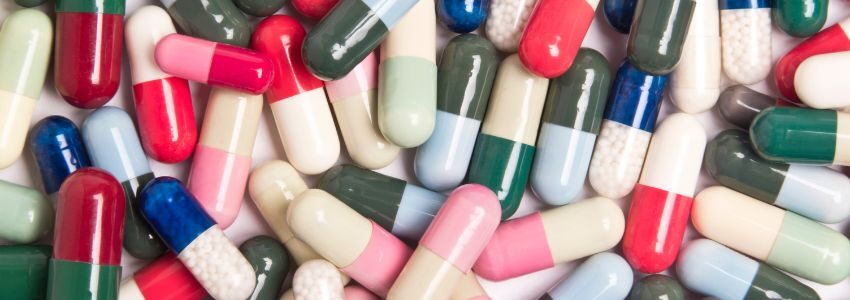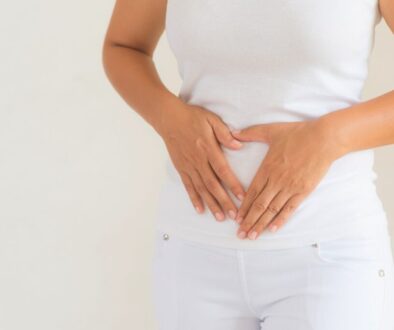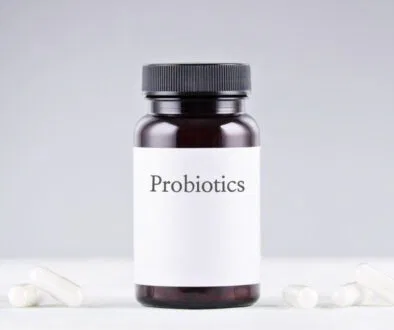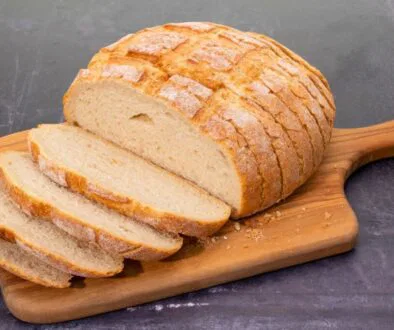Do Antibiotics Cause Constipation? What You Need to Know

Published October 13, 2023
The use of antibiotics in the United States is among the highest in the world. It is a drug prescribed to four out of five Americans every year. They are an effective treatment and prevention of a variety of bacterial infections. Antibiotics heal many illnesses ranging from pneumonia to UTI. Most of us have taken them at some point in our lives.
When doctors prescribe these drugs, they believe the benefits outweigh the possible side effects. You can undoubtedly tolerate an upset stomach, soft stools, vomiting, and photosensitivity. Most people know about and expect these side effects. Also, doctors and pharmacists warn you about them.
One downside of antibiotics is the risk of constipation. It is a conduction in which you have difficulty releasing solid waste from your body. Here, stools are infrequent. They may be less than three each week. They may be hard, dry, and small. They are very painful and difficult to pass.
Constipation can also be very damaging to our health. It can deter our body’s ability to release toxins, which may weaken our immune system. Keep reading if you’re looking for a health guide about how antibiotics cause constipation. We’ll discuss everything you need to know about it. Also, how to protect your gut while on an antibiotic treatment. Let’s start.
Do Antibiotics Cause Constipation?
Antibiotics do their job by killing bacteria. Broad-spectrum antibiotics kill a broad range of them. In doing so, it increases the chances of recovering from an infection. Yet, it also means they may kill beneficial bacteria, including gut bacteria.
Alteration in the gut bacteria, or the gut microbiome, triggers constipation. A 2021 paper argues that this connection is likely bidirectional. It means that modifications in the gut microbiome may start gastrointestinal problems. In turn, this triggers more gastrointestinal issues, including constipation.
For this reason, a person who experiences constipation while on antibiotics should not assume that antibiotics are the reason. Numerous other factors can explain its occurrence. For instance, some people become constipated when they do not take enough liquids. Fever can cause dehydration. Some do not drink as many fluids when they feel sick. People taking antibiotics will likely have a fever, illness, or both.
Still, the bottomline is antibiotics may cause constipation in two ways. The first is by wreaking havoc with an individual’s gut bacteria. Secondly, it depletes the body of crucial minerals for your gastrointestinal system to function at its best.
How Long Does Stomach Pain From Antibiotics Last?
The pain can endure for a few days. In some cases, the entire period while taking antibiotics. Suppose the pain is mild. All you have to do is follow the below measures to cure a stomach ache. In case of severe pain, stop taking the dose. You ought to get instant support from your gastroenterologist.
To lessen the side effects of antibiotics and stop stomach pain and other symptoms. It’s vital to keep your good bacteria safe. We’ll talk about this more later.
Upset Stomach From Antibiotics: Antibiotic-associated Diarrhea
Antibiotic-associated diarrhea passes loose, watery stools numerous times daily after antibiotics.
About 1 in 5 people who take this medication to treat bacterial infection will develop it. Most often, it is mild and requires no treatment. The diarrhea usually clears up within a few days. It is after you stop taking antibiotics. Most severe antibiotic-associated diarrhea demands stopping or switching medication.
The only symptoms of an upset stomach from antibiotics are loose stools and more frequent bowel movements. The signs will likely begin about a week after taking an antibiotic. Yet, the diarrhea and other symptoms sometimes do not manifest until days, even weeks, after finishing the treatment.
Clostridium difficile infection is a toxin-producing bacteria. It can cause more severe antibiotic-associated diarrhea. In addition to loose stools and frequent bowel movements, it can cause severe dehydration. It also triggers lower abdominal pain, cramping, low-grade fever, and nausea. Finally, loss of appetite.
Do Antibiotics Make You Bloated?
Antibiotics cause the destruction of digestive flora. It also triggers bacteria imbalance. The two of which are the most common causes of bloating. Additionally, they can cause a change in bowel habits and food and nutrient absorption. It may cause you to feel tired and weak.
Side Effects of Antibiotics
Antibiotics can help battle bacterial infections that won’t clear up on their own. Yet, they can introduce side effects ranging from mild to severe.
1. Headaches
Headaches are a usual side effect of taking certain antibiotics. These antibiotics are:
- Augmentin
- Keflex
- Monurol
- Nitrofurantoin
- Vancomycin
- Quinolones
2. Digestive Problems
Most antibiotics can trigger a range of gastrointestinal issues. Some side effects include:
- Abdominal discomfort
- Abdominal pain
- Lack of appetite
- Bloating
- Constipation
- Nausea and vomiting
- Diarrhea
While you may not be able to safeguard gastrointestinal distress, ultimately, you can help manage your symptoms. Staying hydrated can alleviate some digestive issues.
If you’re experiencing persistent digestive upset, speak with a healthcare provider. It could be a sign of Clostridium difficile. It is an antibiotic-resistant bacterial infection that causes diarrhea that can direct to severe colon damage.
3. Sensitivity to sunlight
Some antibiotics can cause photosensitivity. Your eyes and skin become more vulnerable to sunlight. Photosensitivity can trigger skin irritations. Also, an allergic reaction due to sun exposure, though that response may be delayed up to many days.
Antibiotics that may cause photosensitivity can include:
- Cipro
- Levofloxacin
- Ofloxacin
- Primsol
- Achromycin V
- Doxycycline
4. Yeast infections and other fungal infections
Antibiotics work to fight bacteria generating your infection. Yet, they can also kill off the good bacteria in your body. By eliminating beneficial bacteria, they can make you more likely to develop a fungal infection. For one, yeast infection.
5. Tooth Staining
Older-class tetracycline antibiotics may cause lasting tooth staining in children. It is the cause for children under eight years old.
Evidence suggests that a short course of doxycycline doesn’t cause tooth-related side effects.
6. Tendonitis
Research shows there may be a relationship between tendon damage and antibiotics. Yet, this side effect is rare.
One study suggests that antibiotic levofloxacin may heighten the risk of tendon ruptures. It is a port of a group of antibiotics called fluoroquinolones.
How to Take Care of Yourself While Taking Antibiotics
1. Take the drug properly.
Get rid of the infection by taking your antibiotics properly. Not all of them are the same. Do not just skim the instructions for your prescription. This information can be detailed. How you take them is a big deal.
Get answers to any questions you have. Tell your doctor about every vitamin, supplement, and medication you take.
If you don’t adhere to the proper instructions, the drug won’t be fully effective. It may also take a further toll on your body.
2. Ease side effects
Make good food choices to give your body the nutrients it needs for healing. You may be able to take probiotics a few hours after your dose. They may help prevent diarrhea. They can also help you repopulate your gut microbiome.
Neglect your to-do list. Plan for extra sleep. Go to bed earlier. It helps to slow down. Your body will be able to use these breaks to recover. Pushing yourself will only slow your recovery.
Take time to care for yourself. Do something that makes you feel euphoric. Adding a few blobs of aromatherapy oil to your shower is one low-effort means to feel better while recovering.
3. Rebuild your gut microbiome.
Pay close attention to what you put in your body. When sick and lacking energy, it can be hard to resist easy-to-eat, low-prep processed foods. Do not give in to these unhealthy products. You need to help your body by giving it plenty of whole foods. Take your vitamins accordingly. Enjoy some fermented foods with live, active cultures.
Drink up. Hydration is especially critical if you’ve been experiencing diarrhea or vomiting due to your medication.
Listen to your body. Do not overdo it the moment you begin feeling better. Yes, you have a lot to catch up on. Yes, working your way up is essential until your energy levels return to normal. Doing too much too fast inhibits recovery.
Slowly work your way back into your exercise regime. Don’t start where you left off. Give yourself time to accumulate strength and energy.
What to Eat When You’re on Antibiotics
1. Take probiotics.
While on antibiotics treatment, it can alter the gut microbiota. It can lead to antibiotic-associated diarrhea, especially in children. It is where probiotics may be able to help.
Research affirms that taking probiotics while or after taking antibiotics can assist in preserving the bacterial diversity of the gut. It also seems to lessen the amount of antibiotic resistance fences in your gut. The latter can help offset antibiotic resistance.
2. Eat fermented foods
Specific foods can help heal the gut microbiota after damage introduced by antibiotics. Microbes produce fermented foods. They include yogurt, cheese, sauerkraut, kombucha, and kimchi, to name a few. They contain several wholesome bacteria species. One of which is Lactobacilli, which is known to support restoring the gut microbiota to a healthy state after antibiotics.
Thus, eating fermented foods may help better gut health following antibiotic treatment.
3. Eat high-fiber foods
Your body cannot digest fiber. It can, however, be digested by your gut bacteria. In doing so, it helps stimulate their growth.
As a result, high-fiber foods may help restore healthy gut bacteria after finishing antibiotics. Research from 2022 confirmed that consuming soluble fiber daily may help lessen ARGs in your gut.
It’s best to consume high-fiber foods after completing your antibiotic course. Fiber can lessen antibiotic absorption.
4. Eat prebiotic foods
Prebiotics are food that feeds the good bacteria in your gut. Yet, other foods not high in fiber act as prebiotics by helping the hike of healthy bacteria.
For instance, red wine has antioxidant polyphenols. They are not digested by human cells. Yet, they are digested by gut bacteria.
Similarly, coca contains antioxidant polyphenols. They have beneficial prebiotic effects on the gut microbiota.

Frequently Asked Questions About Do Antibiotics Cause Constipation
1. What helps with constipation when taking antibiotics?
One thing you can do to ease constipation is to consume foods high in fiber. Cut yourself some fruits, add vegetables to your meals, and shop for whole grains and legumes. All can help promote regular bowel movements. They can relieve constipation.
2. Do antibiotics affect bowel movements?
Yes, antibiotics can affect bowel movements. One side effect of this medication is diarrhea or loose stools. Antibiotics can disrupt the average balance of bacteria in the gut. Hence leading to changes in bowel movements.
3. How long is too long not pooping?
Going longer than three days without a movement is generally considered too long. It may indicate constipation already.
4. Should I keep eating if I’m constipated?
If you are constipated, it is generally recommended to continue eating. Yet, making mindful food choices that can help alleviate constipation is vital. Consume foods high in fiber. Take prebiotics. Stay Hydrated. Finally, avoid processed foods.
In times of sickness, antibiotics can help bring healing. Yet, you must be mindful of the side effects that they can do to your body. That way, you can take proactive steps toward alleviating them and promoting your overall health and wellness.
Share our health article with those in need. It always helps to raise awareness of topics that concern our well-being.
Benefit From The Latest Advancements In Probiotic Science With Bionaze
Bionaze is a proprietary blend of probiotics proven to promote ear, nose, and throat health, improve digestion, and support your immune system. The active ingredients BLIS K12, and BL-04 are considered among the best probiotics according to science.
Get 25% Off Your First Order when you use BIO25 at checkout!

This Content Has Been Reviewed For Factual Accuracy
This content has undergone thorough fact-checking by our team of internal experts. Learn more about the meticulous editorial standard for our website here.
ADVERTISEMENT

About The Author
I am Tracy Gorman, a seasoned writer passionate about creating helpful content. I can delve into any niche and produce valuable articles with my expertise. Beyond writing, I am an avid learner with a passion for digital marketing. During my leisure time, I enjoy immersing myself in literature, experimenting with fashion, staying active, exploring culinary delights, indulging in movies, savoring music, and socializing. And, it’s safe to say, I love cats!




